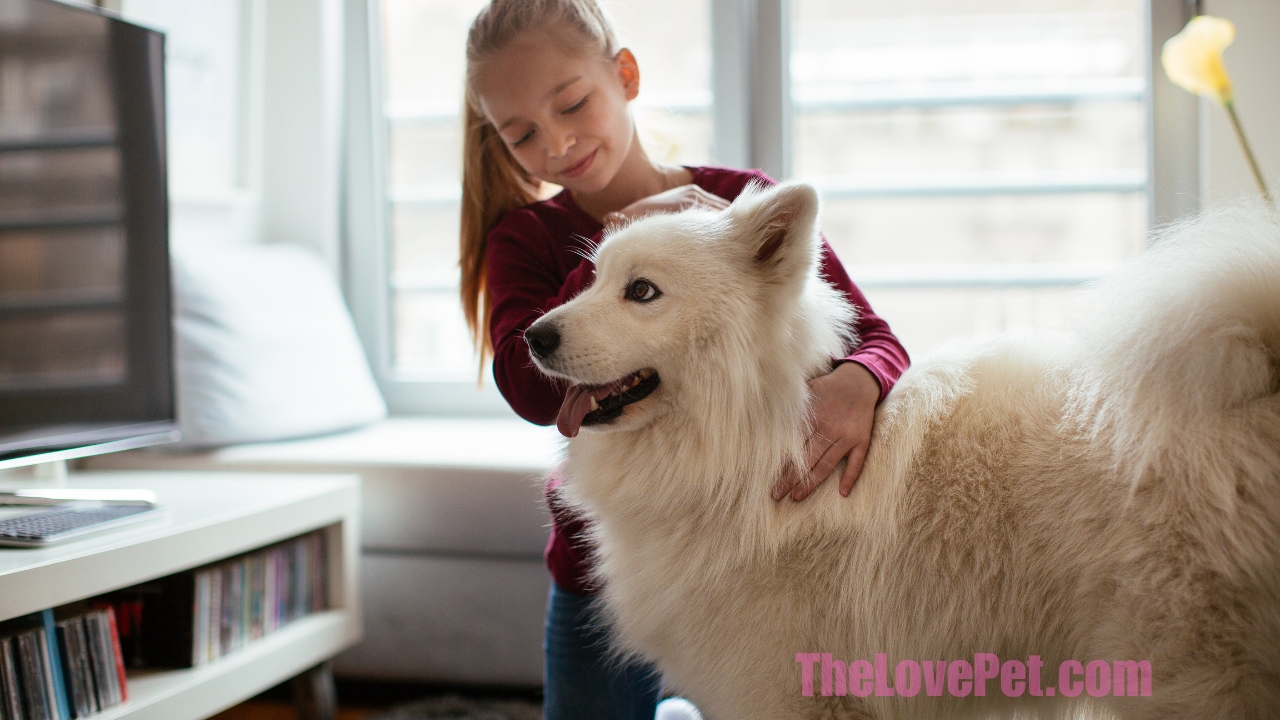It’s a Sign of Affection
One of the main reasons dogs lick when being petted is to show affection. Licking is a natural dog behavior that stems from their wolf ancestry, when parents would lick their pups to groom them and show care. So when your dog licks you while petting, it’s their way of saying “I love you!” It releases feel-good chemicals in their brain and allows them to bond with you.
They’re Seeking Attention
Dogs also lick for attention. If your dog wants you to keep petting them, they may give your hand a lick to get you to continue. Licking is self-rewarding for dogs, so they do it to encourage the petting to go on. It signals “That feels good, keep petting!” This is especially true for dogs who aren’t getting enough positive attention or physical contact from their owners.
It Spreads Their Scent
By licking you, dogs deposit their scent and claim you as their own. Their saliva contains pheromones and other chemical markers that mark you as part of their family “pack.” This is very calming and satisfying for dogs. So in a sense, your dog is hugging you with their mouth and saying “You’re mine!” when they lick you during pets.
To Groom You
Some dogs will lick you simply as a way to groom you. Oral grooming is how dogs would groom and bond with their puppies. Your dog sees you as part of their family, so they mimic their parental behaviors by licking you. It may be their attempt to smooth down your hair, remove dead skin, or distribute your protective oils over your body. For them, licking is almost like brushing your hair!
The Takeaway
Most dog owners don’t mind this behavior, as long as it’s not excessive. But if you want to discourage it, just stop petting when they lick. With time, your dog will learn that licking stops the affection. For most dogs though, licking when petted is a completely natural way for them to show you love.
More on Why Dogs Lick When Petted
It Releases Endorphins
Licking causes the release of endorphins in a dog’s brain, creating a pleasurable sensation. That’s why they keep licking! The same endorphins released when petted also make dogs feel relaxed and bonded to their owner.
It Soothes Anxiety
Licking produces endorphins which help relieve stress and anxiety in dogs. It can be a self-soothing behavior that calms them. So dogs may lick more when nervous or to offset unfamiliar or stressful situations.
It Shows Submission
By licking their owner, dogs signal submission and deference to you as the “pack leader.” It’s their way of showing you respect in the family hierarchy.
It’s Instinctual
Most puppies naturally start licking their owners as young as 6-8 weeks old without any training. This demonstrates that oral affection is an innate behavior in dogs.
It Creates a Feedback Loop
The more a dog licks, the more petting it receives, which leads to more licking. This mutually reinforcing cycle further strengthens their bonding with you.
#FAQ #Update #AdditionalContent
1. Why does my dog lick me when I pet her?
2. What is the science behind a dog’s affectionate licking behavior?
3. Can puppy kisses be a form of communication between dogs and humans?
4. Are there health considerations associated with dogs licking their owners?
5. Has the belief that dogs lick humans as a sign of submission been debunked?
There’s a unique joy in the affectionate nuzzle of a dog, especially when it comes with those loving puppy kisses. But have you ever wondered why your dog seems to lick you every time you pet her? This seemingly simple gesture is packed with meaning, and it’s more than just a way for your pup to say hello. Let’s delve into the psychology and instinctive behaviors behind this common canine action.
The Science Behind the Slobbery Affection
When you come home after a long day, your furry friend is likely the first to greet you, and often with enthusiastic licks. But what does this mean? Some scientists believe that this is a dog’s way of tasting your skin to understand where you’ve been or what you’ve eaten. Others think it’s a sign of submission, or perhaps even affection. Whatever the reason, one thing is sure: those puppy kisses have a lot more going on than just simple affection.
The Instinctive Behavior of Dogs
Puppy kisses may seem unique, but they’re part of a broader instinctive behavior pattern in dogs. They start as puppies, licking their mother’s face to signal hunger. As they grow, this behavior evolves into a social mechanism. For example, my neighbor’s dog, Max, always licks his human friends’ faces. Max’s owners used an to train him to stay in the yard, but the licking never stopped. It’s his way of saying hello and communicating affection.
The Connection to Human Behavior
Humans play a role in this behavior too. We often reinforce the licking by smiling, laughing, or petting the dog more, which encourages them to repeat the behavior. I remember a time when my sister was looking for and stumbled upon a Non Squeaky Dog Toy. She bought it for her pet, and as she was presenting the toy, her dog responded with joyful licks as if expressing gratitude for the new plaything.
Health Considerations
Not everyone appreciates the sloppy love, especially if they have concerns about hygiene. There is ongoing research on the health benefits and risks of puppy kisses. While many claim it’s harmless, others warn about the potential transfer of bacteria or parasites. Choosing the right Dog Shampoos for Sensitive & Itchy skin might help in keeping your pet clean and reducing any risk from licking. And for those who prefer a less messy expression of affection, there are always No Stuffing Dog Toys to keep your furry friend entertained.
Puppy Kisses as a Form of Communication
Dogs have an extraordinary ability to communicate with their human companions. Puppy kisses, those loving licks that often follow a petting session, are one of the most commonly recognized forms of this communication. Consider the story of Bella, a rescue dog who used to live in a shelter. She was shy and would often cower away from human touch. After being adopted by a loving family, Bella gradually began to lick her new owners’ hands. These were not just puppy kisses but signs of trust and comfort, a bridge of understanding built between two different species.
A Source of Comfort
Some dog owners believe that their pets lick them because it’s comforting to the dog. Like a child sucking their thumb, licking can soothe a dog. I’ve witnessed a scenario where a friend’s dog, after being frightened by a thunderstorm, found solace by licking her owner’s hand repeatedly. The connection was not one-sided; it comforted the owner as well.
Training to Control Licking
Puppy kisses can be adorable, but excessive licking may become a problem for some owners. How can one control or minimize this behavior without hurting the bond between human and pet? Positive reinforcement is key here. Rewarding a dog with treats or affection when it behaves the way you want, and ignoring or redirecting undesired behaviors, can be effective. Consider, for instance, the use of No as a distraction from licking. These toys can provide an engaging alternative, helping to channel the dog’s energy into a more desirable form of play.
Debunking Myths
There’s a lot of misinformation surrounding the subject of puppy kisses. Some think it’s all about tasting food remnants, while others believe it’s a sign of dominance. By understanding the true nature of this behavior, we can better appreciate the rich emotional life of our furry companions and foster a deeper connection.
The Role of Health and Hygiene
Maintaining good health and hygiene is essential for both pet and owner, especially when it comes to licking. Regular grooming, using products like, can help maintain your pet’s health. Clean paws and a fresh coat can make puppy kisses a more pleasant experience for all involved. Additionally, understanding the potential health risks and ensuring your pet’s vaccinations are up to date will minimize any concerns about infections or diseases transmitted through licking.
The Language of Licking
For dogs, licking isn’t just a random act. It’s a complex form of communication that can mean many things. Imagine a scenario where you are petting a friend’s dog, and it begins to lick your hand. This might be the dog’s way of saying, “I like you, and I want to be friends.” It could also be asking for more attention or expressing its excitement about a new person in its life. Every lick is like a word in a dog’s language, and understanding this language can deepen our connection with our furry friends.
Puppy Kisses and the Alpha Debate
There was once a belief that dogs licked humans as a sign of submission. This was tied to the theory that dogs live in a strict alpha-beta hierarchy. But recent studies have debunked this idea. The concept of an alpha dog has been largely dismissed by modern ethologists. So, those puppy kisses are not about submission but more about affection, curiosity, or even just a way to get more delicious treats!
Can Licking Be Harmful?
Though we often perceive licking as a sign of love, it might not always be beneficial. Excessive licking can lead to certain problems such as skin irritations or, in rare cases, the spread of zoonotic diseases. A friend once told me about their dog, who had a habit of licking everyone’s feet. While it was a funny quirk, it turned out to be indicative of a dietary deficiency. Veterinary consultation and a proper diet solved the problem, reinforcing the importance of understanding the reasons behind our pets’ behaviors.
Tools to Manage Dog Behavior
Beyond understanding why dogs lick, we can also explore various tools and techniques to manage this behavior. For example, Electric fence for dogs can be a great way to keep your pet within boundaries, but it doesn’t address the issue of licking. However, proper training and positive reinforcement can help in managing this behavior. Incorporating toys like or using accessories like GPS Dog Collars to monitor their activities are ways we can engage with our pets positively, helping us build a relationship that isn’t solely focused on licking.
Embracing the Love of Man’s Best Friend
The answer is multifaceted and rich in emotional and biological complexity. Whether it’s a lick on the hand after a long day at work, a slobbery kiss on the face in the morning, or a gentle lick of comfort when we’re feeling down, these small acts from our furry friends are packed with meaning. By understanding the whys and hows of this common canine behavior, we can enhance our relationships with our dogs, ensuring that the bond we share continues to grow and thrive. And who knows? The next time your dog licks you, you might find yourself not just tolerating the wet embrace but celebrating it as a precious connection between two very different but loving beings.
Fi Dog Collars: The Next Generation of Bonding
In today’s technological age, we are not just limited to traditional ways of understanding and interacting with our canine companions. Advanced tools like Fi dog collars are revolutionizing how we connect with our furry friends. Fi dog collars are not just ordinary dog collars; they come equipped with modern GPS technology, allowing owners to keep track of their dogs’ whereabouts. But what makes them stand out even more is their application in understanding dog behavior, including the mystery of Puppy Kisses: Why Does My Dog Lick Me When I Pet Her?
How Fi Dog Collars Can Enhance Understanding
Imagine being able to track how often your dog interacts with other pets and people. With Fi dog collars, this information is just a few taps away on your smartphone. This can provide valuable insights into your dog’s social behavior. Do they lick certain people more? Are they more affectionate in specific environments or times of the day?
Fi Dog Collars and Training
Fi dog collars can also play a role in training. By understanding your dog’s movements and behaviors, you can tailor training to their specific needs. For instance, if you notice that your dog tends to lick excessively when in a particular area of your home, you can use the insights gained from the Fi dog collar to address this behavior more effectively. It’s like having a behavioral expert with you at all times, helping you understand why your dog is giving you those puppy kisses and how to respond to them.
Safety and Peace of Mind
Beyond understanding and training, Fi dog collars offer an extra layer of safety. The GPS feature ensures that you always know where your dog is, providing peace of mind. It’s not just about preventing unwanted licking or knowing why your dog licks you when you pet her; it’s about ensuring the overall well-being of your beloved pet.
Embracing a New Era of Canine Connection
The introduction of tools like Fi dog collars is a testament to how our relationship with dogs continues to evolve. It’s not just about interpreting those loving licks or controlling behavior; it’s about leveraging technology to foster a deeper, more nuanced connection with man’s best friend. By integrating these advancements into our daily interactions, we can elevate the understanding, training, and care of our pets to levels previously unattainable. From puppy kisses to tracking movements, technology like Fi dog collars opens a new frontier in the loving relationship we share with our dogs, making every lick and wagging tail a part of a broader, richer story of companionship.
FAQs
Q: Why Does My Dog Lick Me When I Pet Her?
A: Dogs often lick their owners as a sign of affection, communication, or sometimes even to seek attention. It’s a multifaceted behavior that can be influenced by their upbringing, environment, and individual personality.
Q: Are Puppy Kisses Safe for Humans?
A: Generally, puppy kisses are safe, but it’s essential to maintain proper hygiene. Regular grooming and using products like Dog Shampoos for Sensitive & Itchy skin can minimize any risks associated with licking.
Q: How Can I Stop My
#FAQ #Update #AdditionalContent
1. Why do dogs lick your feet?
2. Why do dogs lick your face?
3. Why do dogs lick your hands?
4. Why do dogs lick you when you pet them?
5. Is it dangerous for dogs to lick you?
Understanding Canine Licking Behavior
Almost all dog lovers enjoy the affectionate gesture of a dog’s lick. But have you ever wondered why dogs lick humans? In this exploration of canine behavior, we delve into the various reasons behind this common behavior.
Why Dogs Lick You
Dog licking is a multi-faceted behavior that cannot be viewed in isolation. To comprehend why dogs lick, we must consider the context, environment, and the overall well-being of the dog. Here, we present 12 surprising reasons behind this behavior.
Why Do Dogs Lick Your Feet?
Dogs often lick your feet because they find them tasty and filled with intriguing scents. This behavior is linked to their natural inclination to explore and bond with their human companions. Discover the fascinating reasons behind it.
Why Do Dogs Lick Your Face?
When dogs lick your face, it’s not just about showing affection. This behavior is deeply rooted in their ancestral traits and sensory exploration. Learn about the surprising motivations behind face licking and how to interpret it.
Why Do Dogs Lick Your Hands?
Discover why dogs are particularly drawn to licking your hands. Uncover the role of scent and flavor in this behavior, and understand why it occurs more often than you might think.
Why Do Dogs Lick You When You Pet Them?
Ever wondered why your dog licks you while you’re petting them? It’s not a random action. This behavior is influenced by proximity and arousal. Dive into the reasons behind it and gain insights into your dog’s communication.
Why Does My Dog Lick My Ears?
Explore the intriguing connection between dogs and earwax. Learn why dogs are so interested in this sensory experience and how it relates to their natural tendencies.
Why Do Dogs Lick Each Other’s Ears?
Discover the reasons behind dogs licking each other’s ears, a behavior that extends to their interactions with fellow canines. Explore the role of communication, taste, and affection in this canine practice.
Why Do Dogs Lick Their Paws?
Dog paw licking and chewing can be more complex than it seems. This behavior can signal various underlying issues, from medical concerns to simple enjoyment. Learn to discern the reasons behind it and when to seek veterinary advice.
Why Does My Dog Lick My Legs When I Get Out Of The Shower?
Explore why dogs find your legs so enticing after a shower. Uncover the blend of scents and flavors that intrigue them and the convenience factor that plays a role in this behavior.
Why Does My Dog Lick My Armpits?
Discover why dogs are drawn to your armpits. Learn about the rich mix of scents and moisture in this area that piques their interest, and why it’s a natural behavior for dogs.
Why Do Dogs Lick Your Crotch?
Delve into the reasons why dogs may lick your crotch. Understand the role of scent, bacteria, and pheromones in this behavior and dispel common misconceptions about its intentions.
Why Do Dogs Lick You When You Blow In Their Face?
Explore the intriguing connection between a dog’s response to air blowing in their face and their sensory perceptions. Learn why dogs might engage in this behavior when exposed to a gentle breeze.
Why Do Dogs Lick The Air?
Uncover the potential reasons behind dogs licking the air, from behavioral disorders to stress signals. Gain insights into when this behavior might indicate a deeper issue that requires attention.
Why Do Dogs Lick The Floor?
Learn why dogs are naturally inclined to lick the floor. Discover the enticing scents and textures that make the floor an appealing target for their curiosity.
Is It Dangerous For Dogs To Lick You?
Address common concerns about the hygiene and safety of dogs licking humans. Understand when it’s advisable to be cautious and when this affectionate gesture poses minimal risk.









